Imagine compartilhar uma publicação de blog chamada “10 dicas para…” apenas para que o URL termine em uma sequência de números sem sentido. Esse URL não informa aos usuários nem aos mecanismos de pesquisa sobre o conteúdo do artigo.
É por isso que o guia inicial de SEO do Google incentiva o uso de URLs simples e legíveis.
Alguns iniciantes escolhem a configuração do WordPress que usa números nos URLs e acabam descobrindo mais tarde que isso é ruim para o SEO. Muitas vezes nos perguntam qual é a melhor maneira de corrigir isso.
Neste artigo, mostraremos como se livrar dos números dos URLs do WordPress e, em vez disso, usar permalinks legíveis por humanos.
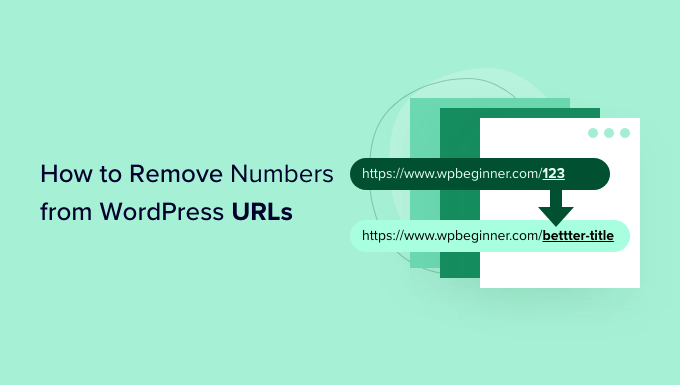
Por que remover números dos URLs do WordPress?
Quando se trata de configurar os URLs do seu site WordPress, é importante que eles sejam compatíveis com SEO e ajudem a explicar seu artigo aos visitantes.
A adição de números a um URL não prejudica o SEO do WordPress nem as classificações de palavras-chave. No entanto, torna mais difícil para os mecanismos de pesquisa entenderem a publicação. Da mesma forma, seus usuários também podem ter dificuldade para encontrar o conteúdo certo se ele contiver apenas números.
Aqui está um exemplo de um URL amigável para SEO que não tem números:
https://www.wpbeginner.com/pt/start-a-wordpress-blog/
Por outro lado, veja como seria seu URL se ele tivesse apenas números, como um ID de postagem:
https://www.wpbeginner.com/pt/?p=11245
Como você pode ver, os links com uma palavra-chave ou uma frase são muito mais fáceis de entender e de encontrar do que os URLs numerados.
Outra vantagem de remover números dos URLs é que você não precisa redirecionar uma publicação de blog sempre que o conteúdo for atualizado. Por exemplo, é uma prática recomendada de SEO remover do URL números como o ano, o dia ou o número total de itens em uma postagem de lista.
Dito isso, vamos ver como remover números de uma URL do WordPress.
Tutorial em vídeo
Se você preferir instruções por escrito, continue lendo.
Remoção de números de URLs de links permanentes do WordPress
O WordPress tem suporte integrado para estruturas de URL compatíveis com SEO.
Tudo o que você precisa fazer é abrir a página Configurações ” Permalinks na área de administração do WordPress e escolher uma estrutura de URL para o seu site.
Você verá diferentes opções para seus permalinks. Elas incluem uma estrutura simples em que o URL contém o ID do post, uma estrutura de dia e nome, uma estrutura de mês e nome, uma estrutura numérica e uma estrutura de nome de post.
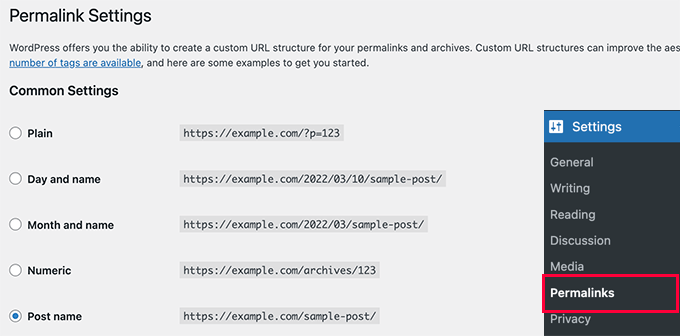
Recomendamos escolher a estrutura “Post name” (Nome da postagem) que mostra o título da postagem no URL, pois ela é compatível com SEO e ajudará outras pessoas a descobrirem seu site nos mecanismos de pesquisa.
Depois de configurar os permalinks, você só precisa salvar as alterações.
Agora, o WordPress também alterará automaticamente os URLs de todas as suas postagens anteriores. Não se preocupe se você tiver publicado os URLs antigos em algum lugar, pois o WordPress redirecionará automaticamente esses usuários para os novos URLs.
Remoção de números de um post ou slug de página
Mesmo que esteja usando permalinks agora, talvez você ainda queira se livrar dos números no URL da postagem do blog. O motivo mais comum para isso é quando você publica uma postagem sem título ou o título contém um número, como um ano.
Lembre-se de que o WordPress escolhe o texto a ser exibido no URL a partir do título de sua postagem; portanto, se sua postagem não tiver um título ou contiver um ano, o WordPress o usará no URL. Em vez do número da postagem, você pode informar manualmente ao WordPress o que usar no URL.
Remover números do URL Slug no editor de blocos do WordPress
Para editar o URL de qualquer conteúdo do seu site, você precisa editar o post ou a página do blog.
Quando estiver no editor de blocos do WordPress, você poderá clicar no ícone de engrenagem no canto superior direito e abrir o painel de configurações.
Em seguida, basta rolar para baixo até a seção Permalink no painel de configurações e editar o URL Slug. Quando você não tiver um título para uma postagem de blog, ele mostrará o ID da postagem por padrão.
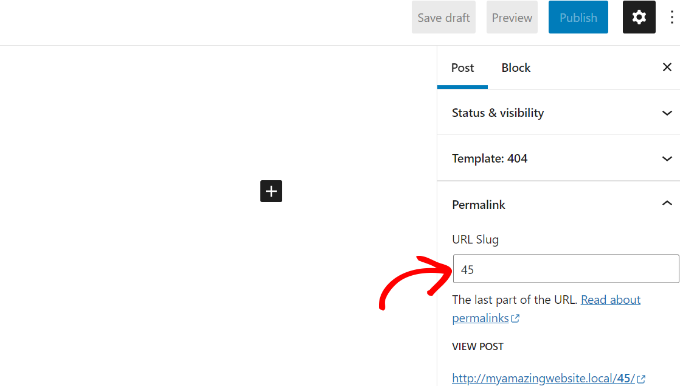
Na captura de tela acima, o WordPress está usando o ID 45 da postagem atual como slug de URL.
Você pode editar isso ou simplesmente inserir um título para a postagem do blog, e o slug do URL será automaticamente alterado para o título da postagem.
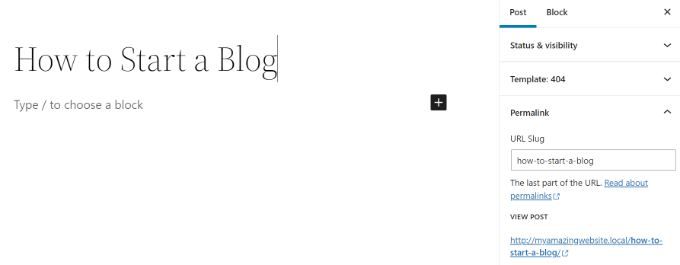
Quando terminar, não se esqueça de publicar ou atualizar sua postagem no blog.
Remover números do URL Slug no editor clássico do WordPress
Se estiver usando o editor clássico do WordPress, você também poderá editar o permalink da postagem e remover os números.
Primeiro, adicione uma nova postagem de blog ou edite uma página existente.
Quando estiver no editor clássico, você verá o URL da sua postagem com um botão “Editar” logo abaixo do título da postagem.
Clicar no botão “Editar” tornará o URL editável. Essa parte editável é chamada de slug de postagem. Você pode inserir o texto que deseja usar como slug de postagem no URL e remover os números.
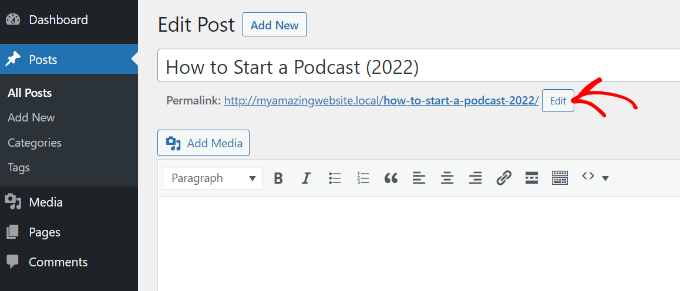
O que acontece com os números em posts e páginas duplicados?
Às vezes, mesmo quando você edita o slug personalizado, o -2 continua a ser adicionado aos seus URLs. Por exemplo, você cria uma nova página Sobre e seu URL fica assim:
https://yoursite.com/about-2/
Agora, você não gostaria de se livrar desse -2 e ter simplesmente /sobre/? Esse problema ocorre quando você já tem o mesmo slug sendo usado.
Verifique todas as suas postagens e páginas para ver se nenhuma tem o mesmo slug, como /sobre/. Se encontrar uma, será necessário excluí-la, a menos que a esteja usando. Na maioria das vezes, você não encontrará uma página ativa com o mesmo slug.
É nesse momento que você precisa procurar na pasta Lixeira. Quando você joga uma postagem ou página do WordPress na lixeira, ela não é totalmente excluída. Ele fica na Lixeira por 30 dias antes de ser excluído permanentemente. Isso é feito para que você tenha a opção de restaurar os itens da lixeira caso os tenha excluído acidentalmente.
O slug não pode ser reutilizado enquanto o post ou a página permanecer na Lixeira. Portanto, se você quiser reutilizar o slug /about/, deverá excluir a página Sobre que está na pasta Lixeira.
Depois de fazer isso, você poderá editar seu slug, como no método mostrado acima, e se livrar do -2.
Essa técnica também funciona para categorias e tags.
Bônus: Configuração de redirecionamentos 301 ao alterar URLs
Sempre que você editar um slug de URL de um conteúdo existente, o WordPress criará uma nova página ou post. Isso resultará em conteúdo duplicado em seu site com slugs diferentes.
Você não quer que isso aconteça porque é ruim para o SEO do WordPress. Isso ocorre porque os mecanismos de pesquisa não saberão qual conteúdo classificar, e a autoridade do link existente não será transferida para o URL recém-alterado.
Uma solução simples é configurar o redirecionamento sempre que você alterar o URL.
OAll in One SEO (AIOSEO) é o melhor plugin de SEO para WordPress e tem mais de 3 milhões de usuários. Ele oferece um poderoso gerenciador de redirecionamento que ajuda a configurar redirecionamentos 301 e a detectar links quebrados em seu site.
Observação: o gerenciador de redirecionamento está disponível na licença do AIOSEO Pro. Há também uma versão gratuita do AIOSEO que você pode usar para começar.
Tudo o que você precisa fazer é inserir o slug que deseja redirecionar (URL de origem) e adicionar o novo URL alterado (URL de destino). A partir daqui, você precisa selecionar “301 Moved Permanently” como seu tipo de redirecionamento.
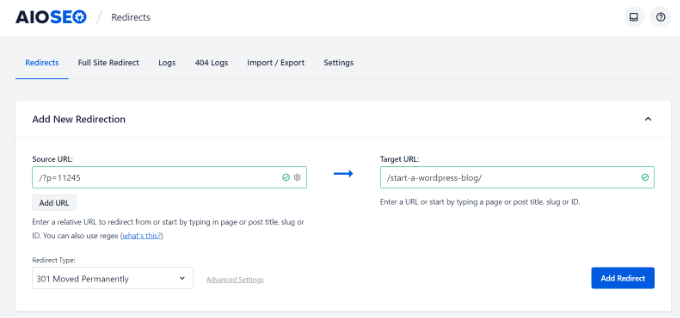
Consulte nosso guia para criar redirecionamentos 301 no WordPress para obter mais detalhes.
Guias especializados sobre URLs do WordPress
Agora que você sabe como remover números de URLs no WordPress, talvez queira ver outros guias relacionados a URLs do WordPress.
- Glossário: URL
- Glossário: Post Slug
- O que é um URL de site (partes importantes explicadas para iniciantes)
- Como criar Permalinks personalizados no WordPress (guia definitivo)
- Como incluir categoria e subcategoria em URLs do WordPress
- Como remover a data dos URLs do WordPress
- Como remover a cadeia de caracteres v=XXXX dos URLs do WordPress
- Como alterar o slug e a base do URL do autor no WordPress
- Como remover o slug pai do URL da página filha no WordPress
- Como se livrar de /wordpress/ do URL do seu site WordPress
Esperamos que este artigo tenha ajudado você a aprender como remover números de URLs do WordPress. Talvez você também queira ver nosso guia sobre como iniciar uma loja on-line e nossa seleção especializada dos melhores aplicativos de números de telefone virtuais para pequenas empresas.
Se você gostou deste artigo, inscreva-se em nosso canal do YouTube para receber tutoriais em vídeo sobre o WordPress. Você também pode nos encontrar no Twitter e no Facebook.





Syed Balkhi says
Hey WPBeginner readers,
Did you know you can win exciting prizes by commenting on WPBeginner?
Every month, our top blog commenters will win HUGE rewards, including premium WordPress plugin licenses and cash prizes.
You can get more details about the contest from here.
Start sharing your thoughts below to stand a chance to win!
LorriAnne says
Looking at these screenshots and then looking at what I have in my WP, I believe someone’s pulling my leg with some really good photoshopped images. This tutorial is not valid.
WPBeginner Support says
Our guide is using the current block editor. If you do not see the same interface there are three likely culprits. If you are using a page builder plugin that would override the default editor with some, if you are using the classic editor plugin you would see the old classic editor interface, or if you are using WordPress.com then you would see their interface instead as our articles are for WordPress.org sites.
Administrador
Hussain Ali says
Can we edit our website’s domain name and keep the data safe?
WPBeginner Support says
Your site’s content would be safe when updating your domain for this tutorial.
Administrador
Thomas says
Hi,
Thank you for a very informative video / article.
I have the same issue that you talk about, where the “-2” appears on one of my sites, however, I have nothing in my trash?
Currently, this issue arises on my local server and I would love to get it fixed before I take this live. Could you help me?
WPBeginner Support says
You would want to try to visit the URL without the -2 in it to see if it directs you to a page in which case you should be able to click the edit option in the admin bar at the top of your site.
Administrador
pankaj says
Awesome!
Thankyou!
WPBeginner Support says
You’re welcome
Administrador
Tamás says
Hello!
I like to get WP to start the numbering on repeating slugs from 8 digits.
E.g. sample-post, then sample-post-0000001
Any idea? I don’t find anything related and would be extremeley important.
Thx!
Best
Tamas
WPBeginner Support says
Sadly, at the moment we do not have a recommended method for setting that up.
Administrador
Ajay says
Dear Editor,
I have a question about how to remove tag from wordpress url?
old url: site.com/tag/movies
New Url : site.com/movies
How do I do that in wordpress? And how do I make the url direct from the old url?
WPBeginner Support says
For the URLs, you would want to take a look at our guide here: https://www.wpbeginner.com/wp-tutorials/how-to-create-custom-permalinks-in-wordpress/
After changing your URLs, you would want to create a redirect using one of the methods here:
https://www.wpbeginner.com/beginners-guide/beginners-guide-to-creating-redirects-in-wordpress/
Administrador
Bilal says
Today, when I working on Login page to place Password recover form short code, I Turn of Social media Login. After that I Logout Admin and checked that, two changes observed, one is Login form shwing very small size, second is all pages showing IDs when open in browser
Now what I do to set it, in settings, Permalinks seting are ok like previous, what thing changed, which showing IDs after url.
Any solution.
WPBeginner Support says
You would want to let the social media login plugin know what happened to the login form after disabling and they should be able to assist. If it is a ? followed by a number then you are likely using an ecommerce plugin that is tracking sessions so it can save the cart for the user.
Administrador
Bita Gh says
I have a problem in my wordpress website. my old website has been linked to my new website though an URL which I can not find. I want to delet or disable that link especially in google search. because that is linked to my old shop and old prices and people keep calling about the differences in prices. please help!
Janice Sullivan says
My links are ok but on the top bar I see “All Posts | “my link name”. ‘All post’ is not part of the name of the page/blog posts or in the link? I can’t figure out how to remove it…any help out there?
Adrian McCarthy says
Thank you, thats such a simple solution and works brilliantly thank you.
Sarah X says
Hello. I did what all the steps you did but the 2 continues to show up in the url. I dont know what to do . i deleted and add like 3 times the same page and that number still there … :s
Whats wrong ? can you help me pls
Appreciate the attention
Sarah. from Portugal
WPBeginner Support says
Hi Sarah,
When you delete a post or page in WordPress, it goes into the trash. You need to delete that page from Trash as well. Go to Pages » All Pages and you will see a row of links to sort pages according to their status (Published, Draft, Scheduled, Trash). Click on the trash to view the pages that you have deleted earlier. Once you are there you will see a link ‘Delete Permanently’ below each article clicking on it will delete the page permanently and you will be able to use that slug for your new page.
Administrador
Kat Zimmer says
Hi there,
I’ve combed through our site and taken all the actions you’ve suggested (permanently delete everything in the trash and ensure there is no photo/media file with that slug) and it’s STILL naming my slug with a -2 at the end. Please help!!
WPBeginner Support says
Hi Kat,
Please check your pages and categories as well. Also try visiting the full url to see if there is a post, page, or attachment with the same slug.
Peter says
How can I produce a list of permalinks that have “-2” at their end, so I can correct them? I have 291 posts, 48 pages, and around 50 product pages.
In addition, I have two ecommerce stores, one for Australia (/shop/bookname) and one USA (/books/bookname), and all products have permalinks. Doesn’t permalinks take notice of the rest of the URL?
Thanks,
Peter
Sarah says
I deleted a post and when I went to make a new one the -2 is STILL there. Any other help?
Shaikh says
I didn’t have any pages still in trash. I didn’t have a category with the same name as my page. I didn’t have another page with the same name. So I did something crazy. WP was trying to name my page as page-2, so I went to mywebsite.com/page to see what happened.
A page with a single photo popped up. I had a PHOTO with the same name as the page, and WP media manager gives photos permalinks based on the file name! Fix was to rename the photo (still keeping SEO in mind), and using the permalink editor for the page. TAH DAH! Like magic, it worked
Chrissy says
Ah, I was pulling my hair out with this and what you’ve found out has solved my issue. Thanks for posting your findings, very helpful…
Janssen says
is there any way to also hide the url link? for example, mysite/mypost/ instead of 192.168.0.1:8080/mypost/
Christa says
I found your post because I do wonder about the following number behind all the pages and posts I have on my website which then looks like this: example.com/?v=b9610cde4c4c.
If I check the number only with google there comes my site with two pages and another very strange facebook website kind of….
I saw that someone commenting did find out about a plugin – so I deactivated all social plugins, I haven’t got hers on my site. The Permalinks are checked and correct and I didn’t find anything to change or this number, in my php. Do you have any Idea, what this could be or must I worry…?
WPBeginner Support says
If you are worried about security of your site, then you can try scanning your website with Sucuri. If the URLs are getting indexed in search, then it is not good for your website’s SEO.
Administrador
Christa says
Hello, thanks for your reply and yes, I will check it at sucuri – good idea! I don’t understand what you mean by “if the URL’s are getting indedexed in search…” what do you mean by that?
Thank You!
Richard says
I Once Had The Problem Of Seeing the -2 slug being shown for duplicate pages left in trash. However with a New Site I was Editing I was Still Having the -2 show up in title but there was not anything in my Trash For Pages. I Finally Searched My domain with the correct title I wanted and Up Popped one Of the images in my IMAGE Library that had the same name of the page I kept trying to correct. So Images with Names the same as your titles will cause this Behavior too. Just My Experience with the problem.
WPBeginner Support says
Images are also stored as attachment which is a built in WordPress post type. Like all other post types attachments also have slugs. So yes if you have an attachment with slug my-first-bike and then you try to add an article with the same slug, then WordPress will add a number to the slug.
Administrador
trey says
Had the same problem on a page. Deactivated all plugins, quick edit of page url. and bingo it now works, tried everything to no avail before!
Paul Sadler says
Unfortunately, this article is a bit simplistic as that is not always what causes the -2 to be added. While it will do it if there is already an “about” and you are adding another page or post called “about”, but it also has problems with numbers as the titles of pages.
I am creating a gallery and some of the layout is a bit manual for organization, partly as I am wrapping text around the intro and conclusion. So I called one of the pages 2015, another 2010, another 2016. Doesn’t matter what I call it, there is nothing in my trash by that name, it is entirely “new”, but WP will NOT allow it. Why? Because it knows it looks like a year and it doesn’t like numbers only in the structure.
So I can’t have “2015 / January” as my structure, it will have to have some other letter in there for the year plus of course I can’t have the “January” page every year, leaving me with a URL that will look like Y2015 / 2015-January…not very elegant I’m afraid, but seems to be the only solution other than running a custom plugin that overwrites the slugs and risks breaking all of the WP install.
Paul
Chirag Gupta says
how can i remove category or tag from url…
example.com/category/mobile >>> example.com/mobile
WPBeginner Support says
See our guide how to change category base prefix in WordPress.
Administrador
andrew says
I seem to no longer be able to add a permalink with just four digits (ie “http://example.com/1223”)
You used to be allowed to do this for posts but not pages, now you can’t do it at all and it is really messing up one of my clients sites.
Devang Sharma says
Thank You very much guyz ! You don’t know how disturb i was…..
Damaris says
How do you change it if you have wordpress beginner?
WPBeginner Staff says
This is unusual behavior. Please deactivate all your WordPress plugins and switch to a default theme like twenty thirteen or twenty fourteen. See if your posts still have links like this. If they do then it is likely that your WordPress security is compromised.
Karon Warren says
I have permalinks set up on my site with “post name” as the default setting. And that does work. However, when you actually click on the live post, it initially comes up with the permalink, but after fully loading, it has a series of numbers/letters attached to the permalink, like this: #.VB2dTCtdVW0
How do I get rid of those numbers from the actual permalink?
Janet Bauske says
Karon, I had the same problem. I found the culprit was the AddThis social bookmarking widget. To remove it, go to the Plugin settings under Settings > AddThis Share > Advanced Tab and turn off the Address Bar Shares Tracking.
Cathy Sirvatka says
I have been trying to figure out the number thing for a long time. Thank you for this!! I had no idea files in the trash were still using the page name!
Steve says
I have the same problem (-2 at the end). I have cleared my trash, etc but I’m still having the same problem. I have an about-2 page, but no sign of an about page. Any ideas?
Rugby says
Really helpful – had problem with -2 being added to my posts page and emptied trash and hey presto gone! Thanks
Theresa says
sometimes the littlest things can feel like a stalemate. thanks for providing all these great tips
Michael Monday says
Splendid !!! You just said it all !!! Thanks a lot for this long-sought solution to the “urgly” url I have had to deal with for months. Now my posts url looks good. Thanks a lot My Balkhi and your team
John says
This is all great information! I would like to know if I can use some of what I find here to post on my site, or include in email campaigns. Specifically, referring to the badge in this post for removing numbers from urls in WP, but also would like to know if there are others available, within the confines of best practices of course.
thanks,
jag
Keith Davis says
Hi Guys
I’ve got pretty permalinks set so I’ve had no problems with that but I have had the 2 appear in a couple of posts.
The first time I trashed a post and started again not realising that trashing is not enough: you have to delete it.
The second time I trashed and deleted the post but still got the dreaded 2 at the end.
No idea why that would happen.
Gretchen Louise says
Is the automatic redirection of permalink styles a new feature? I still use custom .htaccess code but have had issues with it eliminating my date-based archives, too.
patty jones says
WordPress automatically redirects to the new permalinks? I have wanted to change the permalink structure of my site for a long time but worried how it would affect links that are already out there.
Our site has over 4000 posts and I figured it would kill our page rank. What are you thoughts on that many redirects?
jayism says
This is an interesting post, but it does not cover how to remove the site.com/category-2/sub-category/heres-a-post.php – I have this problem, and read it happens when you create a category called software, then delete it, and create it again further down the track – the original ‘software’ remains in the DB for ‘categories’ – therefore it is forced to name the category with a -2 so the Database doesn’t have a duplicate….
The only ways I’ve read to fix this in numerous posts is going into myPHPAdmin and deleting the original ‘software’ manually! Your post has shed some light on the situation, and may have another way to get rid of the -2 fro actual categories?
Thanks,
@jaycameron of ‘Crowd-Sourced Development Initiative’ -> @Code_Collective
Karen says
How excellent! That hint about the trash is a gem. And go ahead and laugh – but – I knew what pretty permalinks were – but was confused if that was what acheived with clicking the Post Name option. I’d been confused because I used to do my Pretty Permalinks using the custom option – until this new button was added. So thanks for solving that tiny mystery for me!